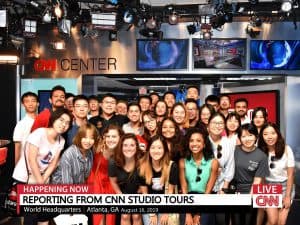Boot Camp: Establishing a common baseline
 When I was looking for an MSBA program, I wanted a program that had students from diverse educational and professional backgrounds. Diversity meant that we tackled problems from various perspectives, but it also meant that we would have various skills and no common baseline before we started an intensive program. Emory’s MSBA program had found a great way to solve this discrepancy—a summer boot camp aimed to review concepts in business, technology, and math.
When I was looking for an MSBA program, I wanted a program that had students from diverse educational and professional backgrounds. Diversity meant that we tackled problems from various perspectives, but it also meant that we would have various skills and no common baseline before we started an intensive program. Emory’s MSBA program had found a great way to solve this discrepancy—a summer boot camp aimed to review concepts in business, technology, and math.
The summer started with the business boot camp that Professor Ram Chellappa, Associate Dean and MSBA Academic Director, termed an “MBA in two weeks.”
In those two weeks, we covered topics in economics, finance, operations, strategy, and marketing. Before we immersed deeper into the tech and data part of the program, this boot camp helped us frame the problems we will be solving in a business context and identify the need for analytical problem-solving in a corporate setting. The business understanding developed during the bootcamp has already been helpful as we apply the CRISP-DM process in our projects for the Business Analytics class.
After brushing up on business concepts, we started the math boot camp, where we reviewed calculus, probabilities and distributions, sampling, matrices, and Bayesian approach. As someone who had not taken a math class in years, I found Professor Michael Miller’s explanations of random variables and their distributions very helpful. I also enjoyed learning about the Bayesian approach to statistics and applying the theorem to various problems. The understanding of eigen values and vectors that I developed during the bootcamp has also aided my learning in classes like Machine Learning.
As someone with a business background, I was looking forward to honing my technical and coding skills in the technology boot camp. The boot camp started with a tech overview that focused on the history of programming and understanding the data generation process in organizations. Through this, I learned how data is stored and retrieved via cookies and how analytics has enabled organizations to make real-time correlations between customer’s needs and shopping patterns to target them with very relevant ads. During the boot camp, we learned to code in bash terminal and familiarized ourselves with the AWS platform. Both bash and AWS were new to a lot of us, hence, we aided each other’s understanding by working through code labs and playing games such as Bandit and Terminus. The boot camp taught me that a coder’s best friend is Google. Most coding issues we struggle with have already been solved by someone and have been explained in websites like Stack Overflow.
In addition to developing our skills in business, technology, and math, we had a problem-solving boot camp where we were taught how to structurally break down complex business problems and work collaboratively towards solving them. “Do not smash and grab the watermelon”, Professor Noonan would say to emphasize that a holistic understanding of a business problem is crucial before the members break out individually to solve the problem. Problem-solving sessions such as these will continue throughout the year as we work through our class projects and eventually work on a capstone project.
The boot camp had something for everyone. It provided us with a chance to identify our areas for improvement and hone our strengths. Besides learning, we also had plenty of time to explore Atlanta, participate in Toastmasters, get to know our classmates better and relax before the Fall classes started.
